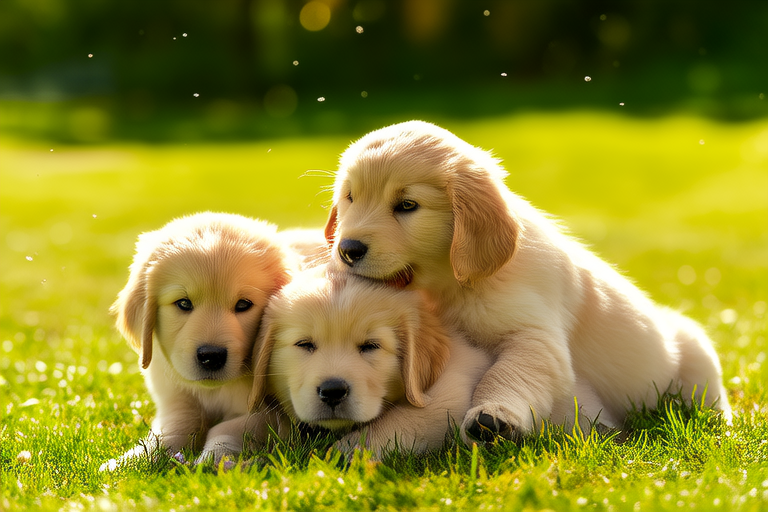Adorable Golden Retriever Puppies: A Guide for New Owners
Welcome to the wonderful world of golden retriever puppies! These lovable, friendly, and intelligent dogs have captured the hearts of many families across the globe. Known for their golden coats, gentle demeanor, and playful nature, golden retrievers are often considered one of the best dog breeds for first-time owners. Whether you’re bringing home your first puppy or expanding your family, this guide will help you navigate the joys and challenges of raising a golden retriever puppy.
Introduction: Why Golden Retrievers Are So Popular
Golden retrievers are popular for several reasons. Their intelligence makes them easy to train, and their affectionate nature ensures they become cherished members of the family. They are great companions for children and other pets, making them ideal for households with multiple members. Their versatility also makes them excellent in various roles, from therapy dogs to hunting partners. With proper care and attention, a golden retriever can bring years of happiness and loyalty to your home.
Basic Care Needs
Raising a golden retriever puppy involves more than just feeding and walking your dog. Proper grooming, nail trimming, and regular veterinary check-ups are essential. Golden retrievers have dense, water-resistant coats that require brushing at least twice a week to prevent matting and reduce shedding. Bathing should be done as needed, typically every few months, depending on your dog’s activity level and environment.
Regular nail trims are important to keep your puppy comfortable and avoid painful splits or breaks. Check your puppy’s nails weekly, and trim them if they start to click against hard surfaces. Ears should be checked and cleaned regularly to prevent infections, especially if your dog spends time swimming or in water.
Veterinary care is crucial for the overall health of your puppy. Schedule initial visits for vaccinations, deworming, and spaying or neutering. Regular check-ups will ensure your puppy remains healthy throughout its life.
Dietary Requirements
Proper nutrition is key to your puppy’s growth and development. Golden retriever puppies need high-quality puppy food that provides balanced nutrition, including proteins, fats, carbohydrates, vitamins, and minerals. Consult your veterinarian to determine the appropriate amount of food based on your puppy’s age, weight, and activity level.
Feeding schedules should be consistent, with two to three meals a day for young puppies transitioning to one meal a day as they mature. Avoid overfeeding, which can lead to obesity and associated health problems. Fresh, clean water should always be available.
Exercise Essentials
Golden retrievers are energetic and need plenty of physical activity to stay healthy and happy. Daily walks, playtime in the yard, and interactive games are all great ways to keep your puppy active. Swimming is another excellent option, given their love for water. However, it’s important to supervise your puppy during swimming sessions to ensure safety.
Interactive toys, such as puzzle feeders and fetch toys, can also provide mental stimulation. Mental exercises are just as important as physical ones, helping to prevent boredom and destructive behaviors. Rotate toys to keep things interesting and engage your puppy’s natural instincts.
Training Tips
Golden retrievers are eager to please and respond well to positive reinforcement training methods. Start training early, ideally when your puppy is around eight weeks old. Basic commands like ‘sit’, ‘stay’, ‘come’, and ‘leave it’ should be taught using treats, praise, and affection.
Consistency is key in training. Use the same command words and gestures each time, and reward your puppy immediately after following a command. Training sessions should be short and frequent, lasting about 10-15 minutes several times a day. Gradually increase the duration and complexity of commands as your puppy learns.
Socialization is equally important. Expose your puppy to different environments, people, and animals to build confidence and good behavior. This can be done through puppy classes, playdates, and trips to parks. Socialized puppies grow into well-adjusted adult dogs who are comfortable in various situations.
Common Health Issues
Like all breeds, golden retrievers are prone to certain health issues. Hip dysplasia, elbow dysplasia, and eye diseases such as cataracts and progressive retinal atrophy are common concerns. Regular veterinary check-ups and genetic testing can help identify potential issues early.
Obesity is another significant concern, particularly in golden retrievers. Maintaining a healthy weight through proper diet and exercise can prevent related health problems such as diabetes, arthritis, and heart disease. Early detection and management of these conditions can significantly improve your dog’s quality of life.
Advice on Socializing Your Puppy
Socializing your golden retriever puppy is vital for its emotional and behavioral development. Begin by introducing your puppy to different people, environments, and experiences. Encourage positive interactions with strangers, children, and other animals to build trust and confidence.
Gradual exposure to various stimuli, such as sounds, sights, and smells, can help your puppy adapt to new situations without fear. Positive reinforcement during socialization sessions will reinforce good behavior and make future encounters more enjoyable for both you and your puppy.
The Emotional Bond Between Owners and Their Golden Retrievers
The bond between you and your golden retriever puppy will deepen over time, creating a special relationship built on trust, love, and companionship. Golden retrievers are known for their loyalty and affection, and they thrive in homes where they are treated as part of the family.
Owning a golden retriever comes with responsibilities, including providing a loving, safe environment and meeting their physical and emotional needs. In return, you’ll experience the joy of having a loyal companion who shares in your daily life. The rewards of owning a golden retriever far outweigh the challenges, making them a beloved choice for many families.
In conclusion, raising a golden retriever puppy is a rewarding journey filled with love, laughter, and learning. By understanding their basic care needs, dietary requirements, exercise essentials, and training tips, you can ensure your puppy grows into a healthy, well-behaved adult dog. Embrace the responsibility of ownership with enthusiasm, and enjoy the many years of companionship and unconditional love that your golden retriever will bring to your life.
